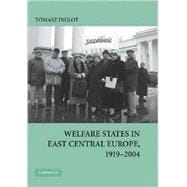
Note: Supplemental materials are not guaranteed with Rental or Used book purchases.
Purchase Benefits
What is included with this book?
| Figures and Tables | p. ix |
| Acknowledgments | p. xiii |
| Introduction: Understanding Past and Present Social Policy Development in East Central Europe | p. 1 |
| Postcommunist Welfare States in Transition | p. 3 |
| The Scope of Analysis: East Central European Welfare States in a Historical Perspective | p. 6 |
| Summary of the Main Argument | p. 8 |
| The Dependent Variable: Major Social Insurance Programs in East Central Europe | p. 15 |
| A Brief Note on Data and Methodology | p. 17 |
| Summary of the Book | p. 19 |
| The Welfare State in East Central Europe: A Conceptual and Theoretical Reconsideration | p. 21 |
| The Welfare State as a Research Problem: West and East | p. 22 |
| Understanding Historical Legacies of Social Policy in East Central Europe | p. 43 |
| Institutional Legacies: State Building, Regime Change, and the Development of National Welfare States in Czechoslovakia, Poland, and Hungary, 1919-1989 | p. 54 |
| Social Protection as a State-Building Project | p. 55 |
| Preexisting Social Policy Institutions | p. 56 |
| Domestic Political and Socioeconomic Conditions | p. 57 |
| Ideational Context: Foreign Influences and Domestic Debates | p. 60 |
| Czechoslovakia | p. 62 |
| Poland | p. 78 |
| Hungary | p. 97 |
| Summary: Comparison of Institutional Legacies and Developmental Stages of the Czechoslovak, Polish, and Hungarian Welfare States | p. 109 |
| Policy Legacies and Welfare States under Communism: Cycles of Social Policy Expansion and Retrenchment in Czechoslovakia, Poland, and Hungary, 1945-1989 | p. 119 |
| Policy Legacies and the "Communist" Welfare States in East Central Europe | p. 119 |
| Cycles of Crisis and the Development of the Welfare State under Communism in East Central Europe | p. 127 |
| Czechoslovakia | p. 131 |
| Poland | p. 147 |
| Hungary | p. 176 |
| Summary: Comparison of Social Policy Legacies of Communism in East Central Europe | p. 195 |
| Historical Legacies, Welfare State Institutions, and the Politics of Social Policy Reforms in Postcommunist East Central Europe, 1989-2004 | p. 211 |
| Historical Legacies and Competing Explanations of Postcommunist Social Policy Developments | p. 212 |
| Institutional and Policy Environment of the Welfare State at the Threshold of Regime Change | p. 214 |
| Institutional Reforms and the Replication of the "Emergency" Policy Cycles of Welfare State Expansion and Retrenchment during the Postcommunist Era | p. 216 |
| Czechoslovakia | p. 219 |
| The Czech Republic | p. 226 |
| Slovakia | p. 238 |
| Poland | p. 252 |
| Hungary | p. 277 |
| Comparative Summary: Path Dependence in Post-1989 Development of Welfare States in East Central Europe | p. 295 |
| Conclusion: Postcommunist "Emergency" Welfare States and Theoretical Exploration of Institutional Change and Social Policy Development | p. 306 |
| Theoretical Implications | p. 307 |
| Bibliography | p. 315 |
| Index | p. 341 |
| Table of Contents provided by Ingram. All Rights Reserved. |
The New copy of this book will include any supplemental materials advertised. Please check the title of the book to determine if it should include any access cards, study guides, lab manuals, CDs, etc.
The Used, Rental and eBook copies of this book are not guaranteed to include any supplemental materials. Typically, only the book itself is included. This is true even if the title states it includes any access cards, study guides, lab manuals, CDs, etc.